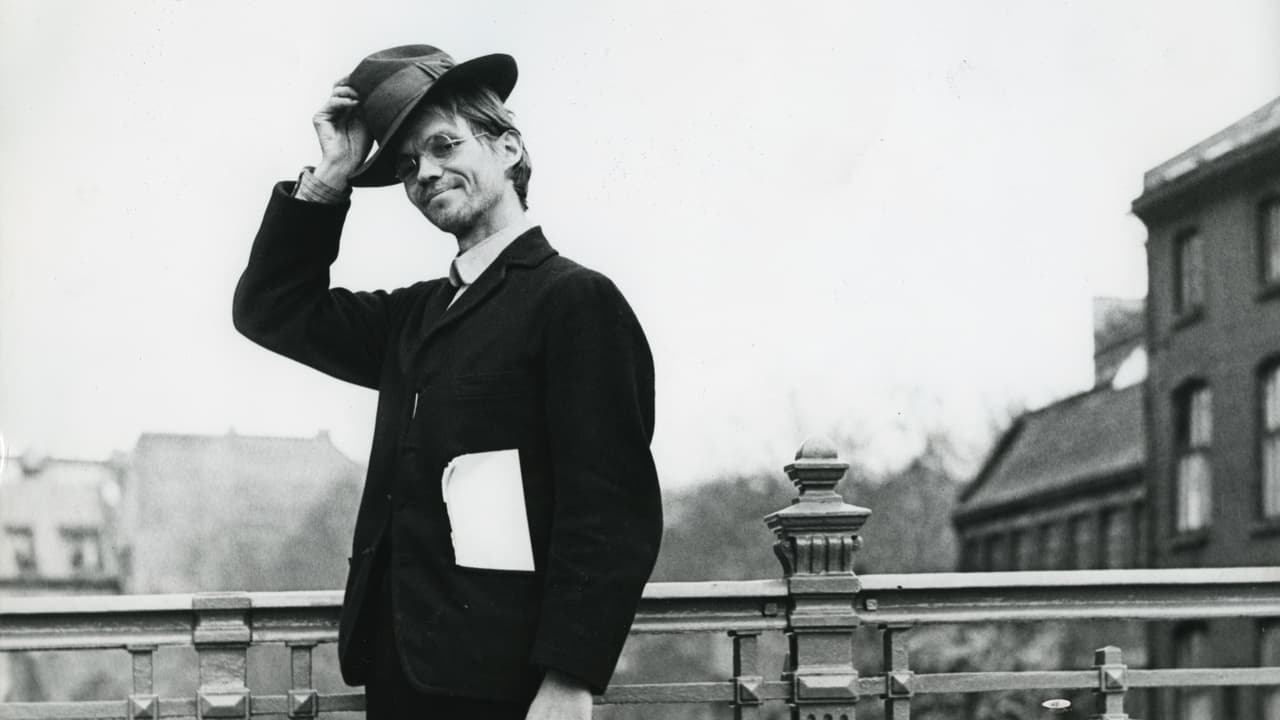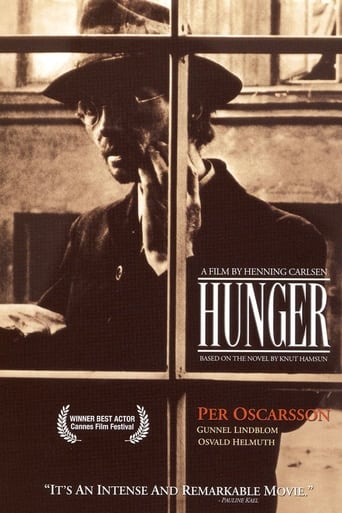

A Brilliant Conflict
... View MoreEasily the biggest piece of Right wing non sense propaganda I ever saw.
... View MoreExactly the movie you think it is, but not the movie you want it to be.
... View MoreThe best films of this genre always show a path and provide a takeaway for being a better person.
... View MoreIn 1890, in Christiania, the penniless aspirant writer Pontus (Per Oscarsson) is unemployed and starved, and near to be evicted from his poor room in a low-budget boarding house. The lonely Pontus has written an article and his hope is that the editor of the local newspaper buys his literary composition to raise money to have a meal and pay his debts to his landlord. However, Pontus is too proud and arrogant to accept any charity or money in advance and despite his poor appearance, he insists to tell other people that he does not need any alms. Further, his honesty does not allow him to keep a change wrongly given to him. The hunger Pontus is becoming delusional and having daydreams due to the lack of food. When the weirdo Pontus sees the gorgeous Ylajali (Gunnel Lindblom) walking on the street with her sister, he flirts with her. Sooner the editor asks him to rewrite his article in an appropriate language of newspaper and Ylajali dates him, and it seems that his dreams will finally come true. "Sult" is an impressive, depressive and heartbreaking character study of one of the most complex characters I have ever seen. The viewer does not have information about the past of Pontus, but his behavior indicates that he was from the aristocracy of the upper-classes that has moved to Norway expecting to become a successful writer but that is actually a loser. Or that he feels superior to the other people and also inferior, at the same time. His personality is contradictory since even under a deep starvation,he keeps his self-esteem, pride and arrogance, capable to hock his jacket to give a handout to a beggar. Pontus does not give-up and only when he indirectly receives money from Ylajali, he is capable to return to his country. I have never read the novel of Knut Hamsun, but it certainly might be a depressing story. Per Oscarsson has one of the best performances I gave ever seen and participates in every scene through his presence, his visions or his feelings. My vote is eight.Title (Brazil): "Fome" ("Hunger")
... View MoreMost people see this film as a sort of tragedy, but in my eyes it is a beautiful comedy comparable to Beckett's "Waiting for Godot". It narrows in on the fundamentals of the human condition, and the main character - like Beckett's - is a 'clown'-figure, a man who can't help himself, who has a fatal dent in his character, which always make him 'trip' and fall. It's like watching an existential, intellectual version of Chaplin's famous vagabond. And the ending, Pontus sailing away from the city in the fog, on an unknown ship, headed God knows where, is a classical fool-comedy-ending - there's no place in society for a man like him, so he leaves on the fools ship. One of the best Danish films ever.
... View MoreAn intriguing character study that focuses on a few days in the life of a writer in 1890 Christiania, `Hunger,' directed by Henning Carlsen, stars Per Oscarsson as Pontus, a starving artist seeking more than just the sustenance of food. Though living in the middle of town, he is emotionally isolated, cut off from the real world because of a perpetual state of disorientation that makes connecting with any reality beyond that which exists in his own mind impossible. Psychological, as well as physical hunger induces the erratic, irrational behavior he exhibits, often at the most inopportune times. Working sporadically on an article throughout the day, the bulk of his time is spent dreaming-- at times hallucinating-- and simply struggling for survival. Yet his suffering is seemingly by choice; there are indications throughout the film that leaving the city to go back to the country, and apparently his home, is an option that is open to him. One he rejects, however, out-of-hand. And while he longs for nourishment of soul and body, because of his mental state and his inability to negotiate even the simplest social amenities, his needs remain elusive, just out of reach. Pontus fails to recognize that the pride and ego that may have at one time sparked the flint of his artistry have now become detrimental, not only to his work, but to his very existence. Carlsen's presentation is fairly academic, and the clinical approach he takes to the material has a way of keeping the audience somewhat at arms length; it doesn't afford the emotional involvement that would've made this a memorable film. As it is, it's compelling to a point, but never manages to deliver what it seems to promise, especially early on. Though Carlsen does a good job overall-- his characters are believable, and the pace he sets, aided by the stark black & white photography, exacts that sense of realism necessary for a film like this to work-- it would've been interesting to see this story developed by someone like Ingmar Bergman, who always had his finger on the pulse of his material and had an affinity for being able to convey the innate humanity of his characters to the screen. Carlsen simply doesn't take the story far-- or deep--enough. And the brief interlude Pontus has with a young woman he calls Ylajali (Gunnel Lindblom) stretches credibility a bit, while the ambiguity of the Rimbaudesque ending is less than satisfying. Oscarsson gives a solid performance as Pontus, his manner and appearance evoking a cross between Tom Courtenay and Guy Pearce; but there's nothing in the character or the way he's played to elicit much sympathy. In the end you're left with the feeling that all of what has happened is rather self-indulgent and unnecessary, while raising some question as to the prudence of suffering for one's art. For how can one deprived of physical and mental faculties hope to create? And that is the very issue it appeared Carlsen was attempting to address until the very end of the film, which compromises any statement he had intended to make. The supporting cast includes Birgitte Federspiel (Ylajali's Sister), Knud Rex (Landlord), Hans W. Petersen (Grocer) and Henki Kolstad (Editor). An interesting, but less than engrossing character study, `Hunger' in the end, is a slice-of-life examination of the human condition that comes up a bit short and leaves you with a feeling every bit as ambiguous as the ending. Had Carlsen been able to maintain the strength of the early part of the film and carry it through to the end, it could've been exceptional; as it is, for those interested in all aspects of filmmaking and who invite comparison, it's worth a look. But anyone seeking an in-depth, riveting character study, or especially those just looking for an evening's entertainment, would be better served looking elsewhere. I rate this one 5/10.
... View MoreExcellent performances by Per Oscarsson, who portrays the starving writer who wanders the streets of Cristiania in search of love and a chance to get his work published. I really liked the way it was filmed, and how we get to look into Oscarssons mind through pictures and music.
... View More